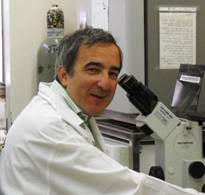Sheba's Prof. Shai Izraeli Discovers a Novel Mechanism Causing Leukemia in Children

Sheba's Prof. Shai Izraeli Discovers a Novel Mechanism
Causing Leukemia in Children
In collaboration with Italian and German leukemia research groups, Prof. Shai Izraeli of the Sheba Medical Center Cancer Research Center has found a novel cause of childhood leukemia. In the recent issue of the prestigious Journal of Experimental Medicine, he and his colleagues describe their findings: that abnormal activation of a cell surface molecule - the receptor for interleukin 7 - causes childhood leukemia.
This finding is significant not only because of its scientific value in describing a novel mechanism for development of leukemia, but it also potentially points to a new target for anti-cancer cellular therapy.
Like much of the scientific research at Sheba, Izraeli's discovery began with patients - children with leukemia. Prof. Izraeli is an internationally known expert on childhood leukemia, and an associate professor in molecular genetics and biochemistry at the Sackler School of Medicine at Tel Aviv University.
Interleukin 7 is a cytokine (a type of hormone) that is responsible for the proper development of the immune system. It acts by binding to a surface molecule called the receptor to interleukin 7. A rare genetic disease, in which this receptor is lacking, causes absence of these immune cells. Thus children born without this receptor suffer from life-endangering infections and can be cured only by bone marrow transplantation.
This observation led Prof. Izraeli to hypothesize that the same receptor may be hyperactive in the opposite condition, namely leukemia, in which there is uncontrolled proliferation of lymphocytes. His team examined more than 600 cases of European children with leukemia, and identified for the first time activating mutations in this receptor.
While 8 of every 10 children with leukemia are cured by intensive and highly toxic chemotherapy, a major challenge is to cure all children with more specific targeted therapy.
This research is significant not only because of its scientific value describing a novel mechanism for creation of leukemia, but points potentially to a new target for therapy. Indeed this study is the third of a series of studies by Prof. Izraeli and his team published over the last three years and confirmed by many international groups. Based on these studies, the Children's Oncology Group in the USA has begun an experimental "Phase I" therapeutic study in children with recurrent leukemia with novel drugs called "JAK inhibitors." Prof. Izraeli believes that in the future such drugs in combination with chemotherapy may provide a targeted specific therapy of this subtype of childhood leukemia.








